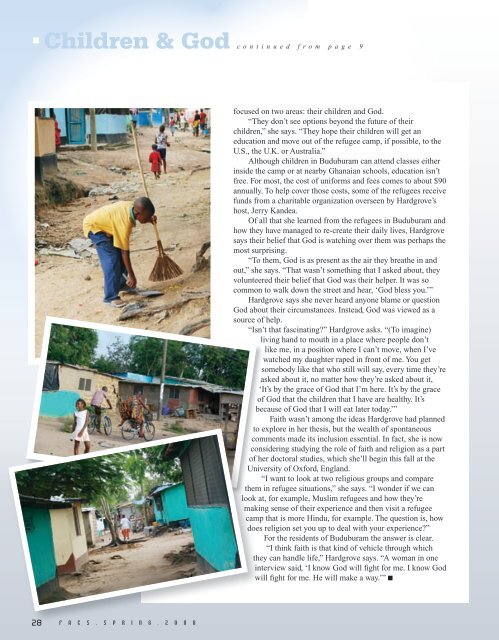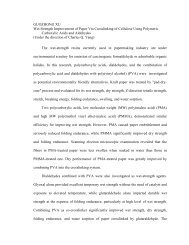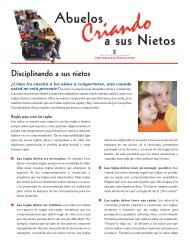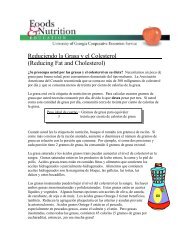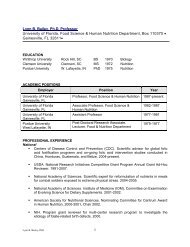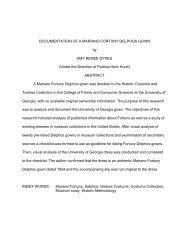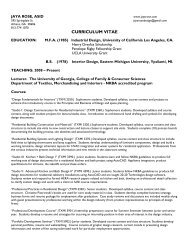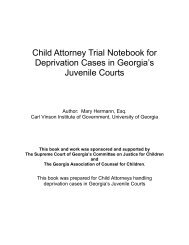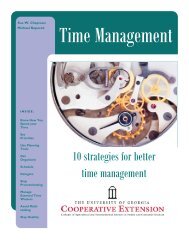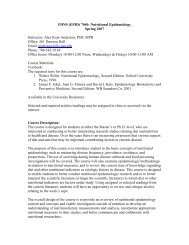G.I.C.H. - University of Georgia
G.I.C.H. - University of Georgia
G.I.C.H. - University of Georgia
Create successful ePaper yourself
Turn your PDF publications into a flip-book with our unique Google optimized e-Paper software.
Children & God continued from page 9<br />
28 F A C S . S P R I N G . 2 0 0 8<br />
focused on two areas: their children and God.<br />
“They don’t see options beyond the future <strong>of</strong> their<br />
children,” she says. “They hope their children will get an<br />
education and move out <strong>of</strong> the refugee camp, if possible, to the<br />
U.S., the U.K. or Australia.”<br />
Although children in Buduburam can attend classes either<br />
inside the camp or at nearby Ghanaian schools, education isn’t<br />
free. For most, the cost <strong>of</strong> uniforms and fees comes to about $90<br />
annually. To help cover those costs, some <strong>of</strong> the refugees receive<br />
funds from a charitable organization overseen by Hardgrove’s<br />
host, Jerry Kandea.<br />
Of all that she learned from the refugees in Buduburam and<br />
how they have managed to re-create their daily lives, Hardgrove<br />
says their belief that God is watching over them was perhaps the<br />
most surprising.<br />
“To them, God is as present as the air they breathe in and<br />
out,” she says. “That wasn’t something that I asked about, they<br />
volunteered their belief that God was their helper. It was so<br />
common to walk down the street and hear, ‘God bless you.’”<br />
Hardgrove says she never heard anyone blame or question<br />
God about their circumstances. Instead, God was viewed as a<br />
source <strong>of</strong> help.<br />
“Isn’t that fascinating?” Hardgrove asks. “(To imagine)<br />
living hand to mouth in a place where people don’t<br />
like me, in a position where I can’t move, when I’ve<br />
watched my daughter raped in front <strong>of</strong> me. You get<br />
somebody like that who still will say, every time they’re<br />
asked about it, no matter how they’re asked about it,<br />
‘It’s by the grace <strong>of</strong> God that I’m here. It’s by the grace<br />
<strong>of</strong> God that the children that I have are healthy. It’s<br />
because <strong>of</strong> God that I will eat later today.’”<br />
Faith wasn’t among the ideas Hardgrove had planned<br />
to explore in her thesis, but the wealth <strong>of</strong> spontaneous<br />
comments made its inclusion essential. In fact, she is now<br />
considering studying the role <strong>of</strong> faith and religion as a part<br />
<strong>of</strong> her doctoral studies, which she’ll begin this fall at the<br />
<strong>University</strong> <strong>of</strong> Oxford, England.<br />
“I want to look at two religious groups and compare<br />
them in refugee situations,” she says. “I wonder if we can<br />
look at, for example, Muslim refugees and how they’re<br />
making sense <strong>of</strong> their experience and then visit a refugee<br />
camp that is more Hindu, for example. The question is, how<br />
does religion set you up to deal with your experience?”<br />
For the residents <strong>of</strong> Buduburam the answer is clear.<br />
“I think faith is that kind <strong>of</strong> vehicle through which<br />
they can handle life,” Hardgrove says. “A woman in one<br />
interview said, ‘I know God will fight for me. I know God<br />
will fight for me. He will make a way.’” n


